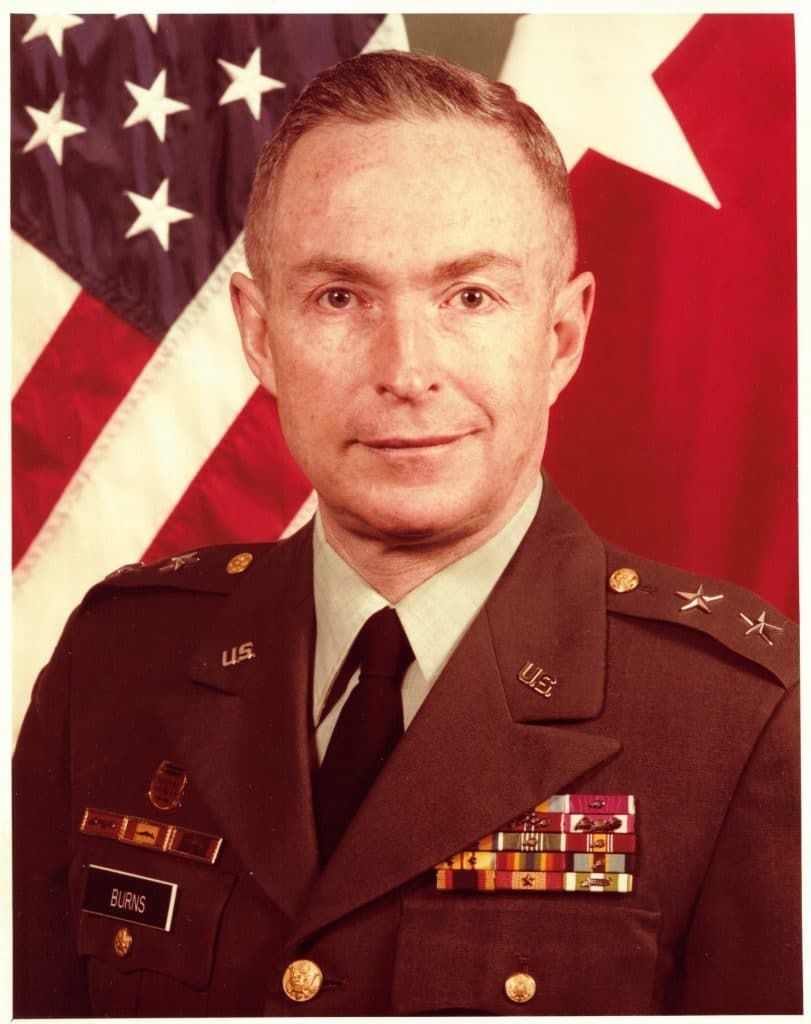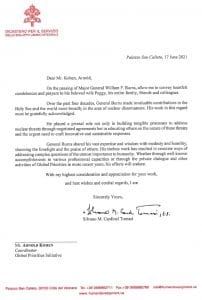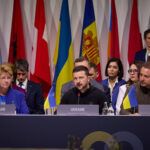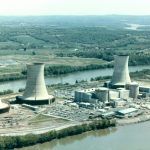William Burns, behind-the-scenes advisor in US-Soviet nuclear talks, dies at 88
By Lawrence J. Korb, Arnold S. Kohen | June 28, 2021
 Maj. Gen. William F. Burns at the United States Army War College. Photo provided by the family and used with permission.
Maj. Gen. William F. Burns at the United States Army War College. Photo provided by the family and used with permission.
Maj. Gen. William F. Burns knew the possibility of nuclear catastrophe better than most. As a young Army officer in Germany during the height of the Cold War, he commanded a unit armed with nuclear weapons. He saw firsthand the many possible ways a conflict might escalate out of control, perhaps through misinformation or miscalculation, with disastrous and unintended consequences. He also knew the dangers of ill-conceived military conflicts, having fought in Vietnam.
These were lessons that drove him to work for the rest of his life in a variety of different ways to reduce the risk of nuclear war. Burns died earlier this month at the age of 88.
It was not in the nature of Gen. Burns to dwell on the specifics of his personal experiences or draw attention to himself. In a political world of large egos and bitter infighting, William F. Burns was, as close associates in nuclear negotiations recall, “extraordinarily quiet and modest, but he figured out how to make that mode of operation extraordinarily effective.” Without drama, he rose to become a significant figure in nuclear arms control and disarmament efforts. He built his prodigious work from behind the scenes, both within the military and as a senior military advisor to negotiating teams and to US secretaries of state and presidents.
In Washington and Geneva during the darkest days of US-Soviet relations in the 1980s, Burns navigated treacherous political terrain. At the time, he served as the senior military member of the US team in Geneva and later as director of the Arms Control and Disarmament Agency. Close associates emphasize that his personal qualities and credibility as a military man with wide experience on nuclear weapons played a pivotal role in supporting Secretary of State George Shultz and President Ronald Reagan in unprecedented talks with the Soviet Union on arms control and disarmament, especially in the face of considerable internal opposition.
When talks between the United States and the Soviet Union in Geneva broke down in 1983, he ignored the negative atmosphere, opting instead to use his time to prepare meticulously for future negotiating opportunities. He relied on experience gathered over several decades and a strong historical perspective. Gen. Burns did not allow himself to become discouraged by the problems of the moment, however daunting. He remained calm in the face of opposition. In this way, he played a crucial role in historic achievements, particularly with the Intermediate-Range Nuclear Forces Treaty that helped bring the Cold War to a peaceful conclusion.
After the breakup of the Soviet Union, which raised new nuclear dangers, Burns led the effort initiated by Sens. Sam Nunn and Richard Lugar to safely secure and eliminate former Soviet nuclear weapons and nuclear materials.

Not every high-ranking army officer or government official retires to spend time with religious leaders and civil society networks, but that is what Gen. Burns did. As a member of the International Justice and Peace Committee of the United States Conference of Catholic Bishops and as an advisor to Global Priorities—an international, interreligious network devoted to reductions in military arsenals in favor of human needs—he worked on a range of initiatives to promote the common good. In these roles, Burns helped draft the bipartisan Global Security Priorities Resolution introduced by Democratic Rep. Jim McGovern and Republican Rep. Dan Lungren. The resolution was “a vehicle to benefit humankind,” according to Kevin Holsclaw, a longtime aide to Lungren. It circulated in Congress from 2008-2012 and advocated for deep reductions in US-Russian nuclear arsenals, with savings devoted to nonproliferation efforts such as the Nunn-Lugar Cooperative Threat Reduction Program as well as urgent humanitarian needs. Endorsed by dozens of religious and secular groups, it stimulated public and private discussion on the need to greatly reduce spending on nuclear weapons.
The congressional resolution led to extended exchanges with the Vatican, where Burns had previously contributed knowledge and experience over the years. His 2014 keynote at the Pontifical Academy of Sciences, “Less nuclear stockpiles, more development,” was given alongside Russian participants. This work laid the foundation for dialogue in recent years with US and Russian experts and religious leaders on practical ways of addressing the dangers of nuclear war. Burns remained active in this conversation until his final weeks.
As the US and Russian governments follow up on the commitment Presidents Biden and Putin made in Geneva on June 16 to work together “to lay the groundwork for future arms control and risk reduction measures,” religious institutions should carry on Gen. Burns’ legacy of spotlighting ethical perspectives in public and private diplomacy. In short, religious leaders and independent experts can encourage worldwide moral and political support for critical initiatives.
Burns’ deep, long-term experience taught him this: Patience and continuous effort are crucial in efforts to reduce the risk of nuclear war. Also, religious leaders, who are not bound by the pressures of election cycles or constrained by the politics of the moment, have a role to play. US and Russian political differences can easily affect nuclear issues. All who are interested in reducing the risk of nuclear war might take a cue from Gen. Burns. That is, they might forgo big egos and bitter infighting in favor of humility, patience, and stamina. Then they can get to work now and in the future reducing formidable global nuclear threats.
Together, we make the world safer.
The Bulletin elevates expert voices above the noise. But as an independent nonprofit organization, our operations depend on the support of readers like you. Help us continue to deliver quality journalism that holds leaders accountable. Your support of our work at any level is important. In return, we promise our coverage will be understandable, influential, vigilant, solution-oriented, and fair-minded. Together we can make a difference.
Keywords: nuclear weapons, obituary
Topics: Nuclear Risk, Nuclear Weapons, Opinion

















The world’s better place thanks to the major general.